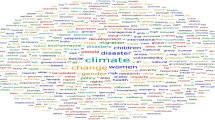Abstract
Climate change faces us with yet another in a long line of actual or potential disasters that have occurred over the last century. One powerful and recurring response to such events frames them as catastrophe from which either physical or spiritual escape is imagined. This article attempts a psycho-social analysis of this apocalyptic response to actual or imagined disasters and traces two variants of this response – the redemptive and the survivalist. Whilst such responses appear radical, I argue that they are essentially a defence in the face of despair that has already found expression within climate change science and activism. In contrast, I suggest that what is required is a realistic response to the possibility of climatic disaster, a possibility the probability of which cannot be known. The quandary we face is how to sound the alarm without being alarmist.
Similar content being viewed by others
References
Adorno, T. (1951, 2005) Minima Moralia: Reflections from damaged life. Translated by D. Redmond, http://www.efn.org/dredmond/.
Anderson, K. and Bows, S. (2008) Reframing the climate change challenge in the light of post-2000 emission trends. Philosophical Transactions of the Royal Society 366: 3863–3882.
Archibugi, D., Held, D. and Kohler, M. (1998) Reimagining Political Community: Studies in Cosmopolitan Democracy. Palo Alto, CA: Stanford University Press.
Britton, R. (1998) Belief and Imagination. London: Routledge.
Cohn, N. (1993) The Pursuit of the Millennium. London: Pimlico.
Editorial. (2010) It's the end of the world as we know it (and we feel fine). Dark Mountain 1: 3–4.
Diamond, J. (2005) Collapse: How Societies Choose Either to Survive or Fail. New York: Viking Penguin.
Fonagy, P. (1999) The transmission of holocaust trauma: Lessons learned from the analysis of an adolescent with obsessive-compulsive disorder. Attachment and Human Development 1 (1): 92–114.
Freud, S. (1911, 1958) Psycho-analytic notes on an autobiographical account of a case of paranoia. Standard Edition, 12. London: Hogarth Press, pp. 9–79.
Freud, S. (1920, 1955) Beyond the pleasure principle. Standard Edition, 18. London: Hogarth Press, pp. 3–64.
Gray, J. (2010) Uncivilization: The Dark Mountain manifesto. New Statesman 10 September, http://www.newstatesman.com/books/2009/09/civilisation-planet-authors, accessed 28 December 2010.
Greer, J. (2008) The Long Descent: A User's Guide to the End of the Industrial Age. Philadelphia: New Society.
Kingsnorth, P. and Monbiot, G. (2009) Is There any Point in Fighting to Stave Off Industrial Apocalypse? ‘Comment is Free’. The Guardian 17 August, http://www.guardian.co.uk/commentisfree/cif-green/2009/aug/17/environment-climate-change, accessed 9 August 2011.
Hardin, G. (1968) The tragedy of the commons. Science 162: 1243–1248.
Hardin, G. (1974) Lifeboat ethics: The case against helping the poor. Psychology Today 8: 38–43.
Hoggett, P. (1998) The internal establishment. In: P.B. Talamo, F. Borgogno and S. Merciai (eds.) Bion's Legacy to Groups. London: Karnac Books, pp. 9–24.
Hoggett, P. (2009) Politics, Identity and Emotion. Boulder, CO: Paradigm.
Horkheimer, M. and Adorno, T.W. (1947) Dialectic of Enlightenment (Cultural Memory in the Present). Palo Alto, CA: Stanford University Press.
Hulme, M. (2009) Why We Disagree About Climate Change: Understanding Controversy, Inaction and Opportunity. Cambridge, UK: Cambridge University Press.
IPCC. (2007) Climate Change 2007: Synthesis Report. Cambridge, UK: Cambridge University Press.
Laing, R.D. (1967) The Politics of Experience and the Bird of Paradise. London: Penguin Books.
Lasch, C. (1978) The Culture of Narcissism. New York: W.W. Norton.
Lasch, C. (1984) The Minimal Self: Psychic Survival in Troubled Times. New York: W.W. Norton.
Lessing, D. (1952, 2001) Martha Quest. New York: HarperCollins/First Perennial Classics.
Lessing, D. (1971, 2009) Briefing for a Descent into Hell. New York: Vintage Books.
Lovelock, J. (2009) The Vanishing Face of Gaia: A Final Warning. London: Allen Lane.
McCarthy, C. (2006, 2009) The Road. New York: Vintage Books.
Meltzer, D., Bremmer, J., Hoxster, S., Weddell, D. and Wittenberg, I. (1975) Explorations in Autism. Perthshire, Scotland: Clunie.
Met Office. (2010) Climate could warm to record levels in 2010, http://www.metoffice.gov.uk/corporate/pressoffice/2009/pr20091210b.html, accessed 12 December 2010.
Nuttall, J. (1970) Bomb Culture. London: Paladin.
Risby, J. (2008) New climate discourse: Alarmist or alarming? Global Environmental Change 18: 26–37.
Riviere, J. (1936) A contribution to the analysis of the negative therapeutic reaction. International Journal of Psycho-Analysis 75: 304–320.
Volkan, V., Ast, G. and Greer, W. (2002) The Third Reich in the Unconscious: Transgenerational Transmission and Its Consequences. NewYork: Brunner-Routledge.
Whitebook, J. (1997) Perversion and Utopia: A Study in Psychoanalysis and Critical Social Theory. Cambridge, MA: MIT Press.
Yusoff, K. (2009) Excess, catastrophe and climate change. Environment and Planning D: Society and Space 27: 1010–1029.
Author information
Authors and Affiliations
Rights and permissions
About this article
Cite this article
Hoggett, P. Climate change and the apocalyptic imagination. Psychoanal Cult Soc 16, 261–275 (2011). https://doi.org/10.1057/pcs.2011.1
Published:
Issue Date:
DOI: https://doi.org/10.1057/pcs.2011.1




